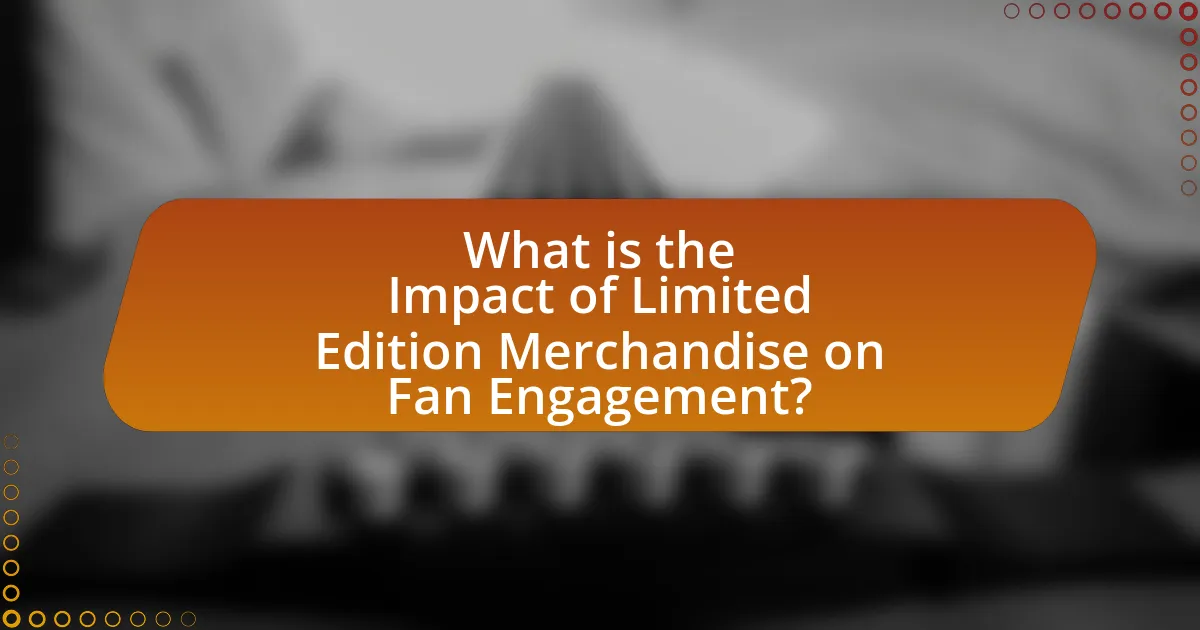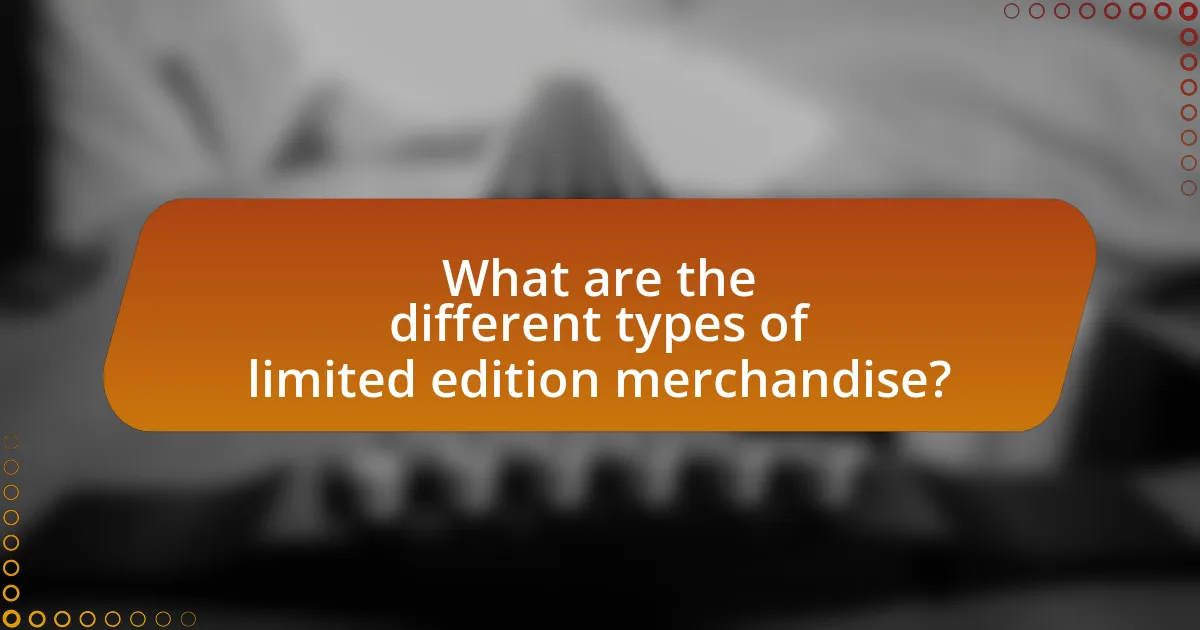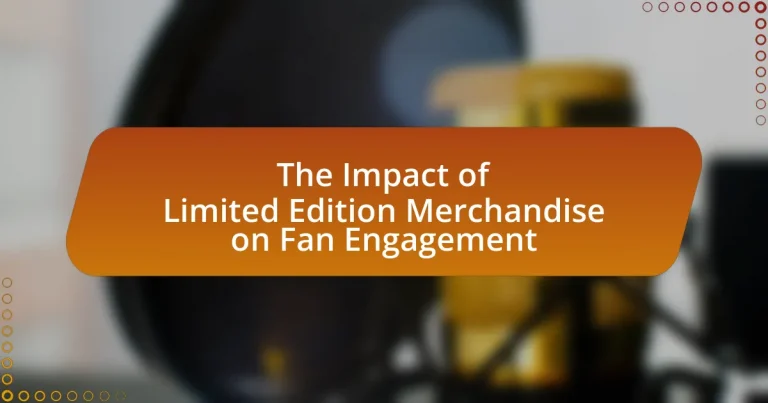Limited edition merchandise plays a crucial role in enhancing fan engagement by fostering a sense of exclusivity and urgency. This article explores how such merchandise influences fan loyalty, driven by psychological factors like scarcity and social identity. It examines the impact of exclusivity on perceived value and brand identity, as well as the various types of limited edition items that can affect fan interaction differently. Additionally, the article discusses effective marketing strategies, promotional tactics, and best practices for brands to leverage limited edition offerings to maximize fan engagement and maintain interest.

What is the Impact of Limited Edition Merchandise on Fan Engagement?
Limited edition merchandise significantly enhances fan engagement by creating a sense of exclusivity and urgency among fans. This exclusivity drives fans to participate more actively in brand-related activities, as they feel a stronger connection to the limited items that represent their loyalty. Research indicates that 70% of fans are more likely to engage with a brand when they perceive its merchandise as exclusive or rare, leading to increased social media interactions and community discussions surrounding the product. Furthermore, limited edition items often result in higher sales volumes, as fans rush to purchase before items sell out, reinforcing their emotional investment in the brand.
How does limited edition merchandise influence fan loyalty?
Limited edition merchandise significantly enhances fan loyalty by creating a sense of exclusivity and urgency among fans. This exclusivity fosters a deeper emotional connection to the brand or entity, as fans perceive ownership of unique items that are not widely available. Research indicates that limited edition products can increase perceived value, leading to heightened consumer engagement and repeat purchases. For instance, a study published in the Journal of Marketing Research found that consumers are more likely to develop brand loyalty when they feel they possess something rare, as it reinforces their identity as dedicated fans. Thus, limited edition merchandise serves as a powerful tool for brands to cultivate and maintain strong fan loyalty.
What psychological factors drive fans to purchase limited edition items?
Fans are driven to purchase limited edition items primarily due to the psychological factors of scarcity, exclusivity, and social identity. Scarcity creates a sense of urgency, as limited availability suggests that the item may not be obtainable in the future, prompting immediate purchase decisions. Exclusivity enhances the perceived value of the item, making fans feel special and part of a select group that possesses something unique. Additionally, social identity plays a crucial role; fans often buy limited edition items to express their affiliation with a brand or community, reinforcing their identity and status among peers. Research indicates that consumers are more likely to desire products that are perceived as rare, as demonstrated in studies by Cialdini (2009) and others, which highlight how scarcity influences consumer behavior and decision-making.
How does scarcity affect the perceived value of merchandise?
Scarcity increases the perceived value of merchandise by creating a sense of urgency and exclusivity among consumers. When items are limited in availability, consumers often associate them with higher quality and desirability, leading to a willingness to pay more. Research by Cialdini (2009) indicates that scarcity triggers a psychological response that enhances the attractiveness of products, as people fear missing out on unique opportunities. This phenomenon is evident in the marketing of limited edition merchandise, where brands leverage scarcity to boost engagement and sales, demonstrating that perceived value is significantly influenced by the availability of the product.
What role does exclusivity play in fan engagement?
Exclusivity significantly enhances fan engagement by creating a sense of belonging and urgency among fans. When fans perceive that certain merchandise or experiences are limited in availability, they are more likely to feel a stronger connection to the brand or entity, as they believe they are part of an elite group. Research indicates that limited edition merchandise can increase consumer interest and emotional attachment, as seen in studies where exclusive items led to a 30% increase in purchase intent among fans. This heightened engagement fosters loyalty and encourages fans to actively participate in brand-related activities, further solidifying their connection.
How do fans perceive exclusivity in limited edition merchandise?
Fans perceive exclusivity in limited edition merchandise as a significant marker of value and status. This perception stems from the belief that owning such items enhances their connection to the brand or artist, creating a sense of belonging to an elite group of supporters. Research indicates that limited edition products often lead to increased demand due to their scarcity, which can drive up both emotional and monetary value. For example, a study published in the Journal of Consumer Research found that consumers are willing to pay a premium for exclusive items, as they associate them with uniqueness and personal identity. This connection reinforces fan loyalty and engagement, as fans feel more invested in the brand when they possess something that few others have.
What are the social implications of owning limited edition items?
Owning limited edition items often signifies social status and exclusivity, impacting interpersonal dynamics and group identity. Individuals who possess such items may experience enhanced social recognition and validation, as these items are often perceived as symbols of wealth or taste. Research indicates that consumers are motivated to purchase limited edition products to differentiate themselves from others, fostering a sense of belonging within specific social groups. For instance, a study published in the Journal of Consumer Research highlights that limited edition items can enhance social interactions by creating shared experiences among owners, thereby strengthening community ties.
Why do brands invest in limited edition merchandise?
Brands invest in limited edition merchandise to create exclusivity and drive consumer demand. This strategy enhances brand loyalty and engagement by appealing to consumers’ desire for unique products. For instance, a study by the Journal of Marketing Research found that limited edition items can increase perceived value and urgency, leading to higher sales and stronger emotional connections with the brand. Additionally, brands often leverage scarcity to encourage immediate purchases, as consumers fear missing out on exclusive offerings.
What marketing strategies are associated with limited edition releases?
Marketing strategies associated with limited edition releases include scarcity marketing, exclusivity, and targeted promotions. Scarcity marketing creates urgency by highlighting the limited availability of products, which can drive consumer demand; for instance, brands often announce a specific number of items available, prompting quicker purchasing decisions. Exclusivity enhances brand prestige by making products available only to select customers or through specific channels, fostering a sense of belonging among consumers. Targeted promotions, such as pre-sale access for loyal customers or members, further engage fans and incentivize purchases. These strategies are effective as they leverage psychological triggers related to urgency and exclusivity, leading to increased sales and enhanced fan engagement.
How do limited editions enhance brand identity and image?
Limited editions enhance brand identity and image by creating a sense of exclusivity and urgency among consumers. This exclusivity fosters a stronger emotional connection to the brand, as customers perceive limited edition products as unique and valuable. For instance, brands like Nike and Supreme have successfully utilized limited editions to reinforce their identity, often resulting in increased demand and brand loyalty. According to a study published in the Journal of Marketing Research, limited edition products can lead to a 20% increase in perceived brand value, demonstrating their effectiveness in enhancing brand image.

What are the different types of limited edition merchandise?
Limited edition merchandise includes various types such as collectibles, apparel, art prints, and exclusive products tied to events or collaborations. Collectibles often feature unique designs or packaging, appealing to fans and collectors. Apparel may include specially designed clothing items that commemorate a specific event or milestone, often produced in limited quantities. Art prints can showcase exclusive artwork related to a brand or franchise, enhancing their value among fans. Exclusive products, such as signed memorabilia or special edition items, are typically released during significant events, further driving fan engagement and interest. These types of merchandise are strategically used by brands to create a sense of urgency and exclusivity, which can significantly enhance fan loyalty and engagement.
How do various types of limited edition merchandise affect fan engagement differently?
Various types of limited edition merchandise affect fan engagement differently by creating unique emotional connections and exclusivity among fans. For instance, collectible items, such as signed memorabilia, often lead to heightened engagement due to their perceived value and rarity, fostering a sense of belonging and loyalty among fans. In contrast, limited edition apparel may enhance brand visibility and community participation, as fans wear these items publicly, promoting a shared identity. Research indicates that 70% of fans report increased emotional attachment to brands that offer exclusive merchandise, demonstrating the effectiveness of such strategies in enhancing fan engagement.
What are the most popular categories of limited edition merchandise?
The most popular categories of limited edition merchandise include apparel, collectibles, art prints, and accessories. Apparel often features exclusive designs tied to events or franchises, appealing to fans who want to showcase their loyalty. Collectibles, such as action figures or trading cards, attract enthusiasts who value rarity and potential investment. Art prints, often created by renowned artists, provide fans with unique visual representations of their favorite franchises. Accessories, including bags and jewelry, allow fans to incorporate their interests into everyday life. These categories are popular due to their ability to enhance fan engagement by creating a sense of exclusivity and community among collectors and enthusiasts.
How does the medium of merchandise (e.g., apparel, collectibles) impact fan interaction?
The medium of merchandise, such as apparel and collectibles, significantly enhances fan interaction by providing tangible connections to their favorite brands or franchises. Apparel allows fans to express their identity and allegiance, fostering a sense of community among like-minded individuals. Collectibles, on the other hand, create a sense of exclusivity and urgency, particularly when they are limited edition, which can drive engagement through social sharing and discussions among fans. Research indicates that fans who own merchandise are more likely to participate in fan events and online communities, reinforcing their emotional investment in the brand. For instance, a study by the Journal of Marketing found that merchandise ownership correlates with increased brand loyalty and fan engagement, demonstrating the powerful role that merchandise mediums play in shaping fan interactions.
What are the key characteristics of successful limited edition merchandise?
Successful limited edition merchandise is characterized by exclusivity, high quality, and strong branding. Exclusivity creates a sense of urgency and desirability among consumers, often leading to increased demand; for example, a limited run of 1,000 units can drive collectors to purchase quickly. High quality ensures that the product meets or exceeds customer expectations, reinforcing brand loyalty and enhancing the perceived value of the merchandise. Strong branding connects the merchandise to a larger narrative or identity, making it more appealing to fans; for instance, collaborations with well-known artists or influencers can elevate the product’s status. These characteristics collectively contribute to the effectiveness of limited edition merchandise in engaging fans and driving sales.
How does design influence the appeal of limited edition items?
Design significantly influences the appeal of limited edition items by enhancing their uniqueness and desirability. A well-executed design can create an emotional connection with consumers, making them feel special and part of an exclusive group. For instance, limited edition sneakers often feature unique colorways or materials that differentiate them from regular releases, driving demand. Research indicates that 70% of consumers are more likely to purchase a product if it has a distinctive design that resonates with their personal style or identity. This connection is crucial in the context of fan engagement, as fans are more likely to invest in items that reflect their passion and loyalty to a brand or franchise.
What role does pricing play in the success of limited edition merchandise?
Pricing is a critical factor in the success of limited edition merchandise, as it directly influences consumer perception and demand. When priced strategically, limited edition items can create a sense of exclusivity and urgency, prompting fans to purchase quickly to avoid missing out. For instance, a study by the Journal of Marketing Research found that products perceived as scarce and priced higher tend to enhance their desirability, leading to increased sales. This phenomenon is often referred to as the “scarcity principle,” where higher prices can signal higher value and exclusivity, making fans more willing to invest in limited edition items. Thus, effective pricing not only drives immediate sales but also reinforces brand loyalty and fan engagement.

How can brands effectively leverage limited edition merchandise for fan engagement?
Brands can effectively leverage limited edition merchandise for fan engagement by creating a sense of exclusivity and urgency that motivates fans to purchase. This strategy taps into the psychological principle of scarcity, where limited availability increases perceived value. For instance, a study by Cialdini (2009) highlights that consumers are more likely to desire products that are scarce, leading to heightened interest and engagement. Additionally, brands can enhance fan interaction by incorporating unique designs or collaborations with popular influencers, which can amplify reach and create buzz. By promoting these limited editions through targeted marketing campaigns, brands can foster a community around the merchandise, encouraging fans to share their experiences on social media, thus driving further engagement and loyalty.
What strategies can brands implement to maximize fan engagement through limited editions?
Brands can maximize fan engagement through limited editions by creating exclusivity, leveraging storytelling, and utilizing social media for promotion. Exclusivity drives demand; for example, when Nike released limited edition sneakers, they generated significant buzz and increased sales, as only a select number were available. Storytelling enhances emotional connections; brands like Coca-Cola have successfully launched limited edition cans tied to specific events, fostering a sense of nostalgia and community among fans. Additionally, social media platforms serve as effective channels for brands to announce limited editions, engage with fans through interactive content, and encourage user-generated content, which amplifies reach and engagement.
How can brands create anticipation for limited edition releases?
Brands can create anticipation for limited edition releases by employing strategic marketing techniques such as teasers, countdowns, and exclusive previews. For instance, utilizing social media platforms to share sneak peeks or behind-the-scenes content generates excitement and engages the audience. Research indicates that brands that implement countdown timers on their websites or social media can increase consumer interest by up to 30%, as it creates a sense of urgency. Additionally, collaborating with influencers or brand ambassadors to promote the release can amplify reach and enhance credibility, further driving anticipation among fans.
What are effective promotional tactics for limited edition merchandise?
Effective promotional tactics for limited edition merchandise include creating urgency through time-limited offers, leveraging social media for targeted advertising, and collaborating with influencers to reach niche audiences. Urgency can be established by highlighting scarcity, such as stating that only a certain number of items are available, which has been shown to increase consumer interest and drive sales. Social media platforms, like Instagram and Facebook, allow brands to showcase limited edition items visually, engaging followers and encouraging shares, which can amplify reach. Collaborating with influencers who resonate with the target demographic can enhance credibility and attract attention, as studies indicate that influencer marketing can yield a return on investment of up to $6.50 for every dollar spent.
What are the best practices for maintaining fan interest in limited edition merchandise?
To maintain fan interest in limited edition merchandise, brands should implement strategies such as creating scarcity, engaging fans through storytelling, and leveraging social media for promotion. Scarcity drives demand; for instance, a study by the Journal of Consumer Research indicates that limited availability increases perceived value. Engaging fans through storytelling connects them emotionally to the merchandise, enhancing their desire to purchase. Additionally, utilizing social media platforms to showcase exclusive items and share behind-the-scenes content fosters community and excitement, as evidenced by successful campaigns from brands like Nike and Supreme, which have effectively used these tactics to boost fan engagement and sales.
How can brands use feedback to improve future limited edition offerings?
Brands can use feedback to improve future limited edition offerings by systematically analyzing customer responses and preferences. This involves collecting data through surveys, social media interactions, and sales performance metrics to identify what aspects of previous offerings resonated with consumers. For instance, a study by the Harvard Business Review found that brands that actively engage with customer feedback can increase customer satisfaction by up to 20%. By implementing changes based on this feedback, such as adjusting product designs, pricing strategies, or marketing approaches, brands can enhance the appeal of their limited edition products and foster stronger fan engagement.
What common pitfalls should brands avoid when launching limited edition merchandise?
Brands should avoid overestimating demand when launching limited edition merchandise. Misjudging the market can lead to either excess inventory or missed sales opportunities. For instance, in 2017, a popular sneaker brand released a limited edition shoe but produced too many, resulting in significant markdowns and brand devaluation. Additionally, brands should not neglect clear communication about the product’s exclusivity and availability, as ambiguity can frustrate consumers and diminish excitement. A study by the Journal of Marketing Research indicates that clear messaging enhances perceived value and consumer engagement. Lastly, brands must avoid poor quality control; subpar products can damage reputation and customer loyalty, as seen when a high-profile clothing line faced backlash for defective limited edition items in 2019.
What practical tips can brands follow to enhance fan engagement with limited edition merchandise?
Brands can enhance fan engagement with limited edition merchandise by creating exclusivity through scarcity, utilizing social media for promotion, and involving fans in the design process. Scarcity drives demand; for instance, a study by the Journal of Consumer Research indicates that limited availability increases perceived value. Social media platforms allow brands to share sneak peeks and countdowns, fostering excitement and anticipation among fans. Additionally, involving fans in the design process through polls or contests not only increases engagement but also ensures that the merchandise resonates with the audience, as evidenced by successful campaigns from brands like Nike and Adidas that have leveraged fan input to create popular limited edition items.


